|
|
|
Sort Order |
|
|
|
Items / Page
|
|
|
|
|
|
|
| Srl | Item |
| 1 |
ID:
117062
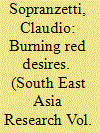

|
|
|
|
|
| Publication |
2012.
|
| Summary/Abstract |
The Red Shirt movement, which reached its peak during May 2010, has been met with puzzlement and ambiguity by media and scholars in and beyond Thailand. Often presented as a one-man-driven movement or a 'peasant revolt', the movement has remained opaque to many observers. This article analyses the ongoing conflict through the eyes of Isan (North Eastern Thai) migrants in Bangkok, especially motorcycle taxi drivers, as motivated by 'politics of desire'. In particular, the article explores how desires for consumption are voiced by a new emerging regional middle class with a diffuse feeling of being stuck between an agricultural past and a self-employed present, due to structural limitations on social and personal development. The author examines the historical emergences and failures of these desires in a complex web of conflicting and overlapping claims to representation, capitalism and class mobility. Positioning desires at the core of the analysis and exploring their configuration and suppression in Thailand through discourses of capitalist access, self-sufficiency and social justice allows severed links to be recovered and apparent contradictions to be reconfigured. This seems necessary to understand the otherwise disconnected and incomprehensible economic, discursive and spatial dimensions of the Thai political conflict.
|
|
|
|
|
|
|
|
|
|
|
|
|
|
|
|
| 2 |
ID:
117061
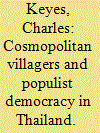

|
|
|
|
|
| Publication |
2012.
|
| Summary/Abstract |
It is the contention of this paper that, because North Eastern villagers or their urban-dwelling close relatives from North East Thailand have become workers in a global system of labour, they have come to understand their place within Thailand as what the author terms 'cosmopolitan villagers' rather than as traditional rice farmers. Even as this transformation has taken place, representations of 'rural' North East Thailand that urban Thai encounter in TV programmes, films, fiction and the media have remained predicated on the assumptions that 'villagers' still live lives that are primarily agrarian and that they have inadequate or misguided understandings of the larger world. It is this disjunction between the 'rural' that cosmopolitan North Easterners actually identify with and the 'rural' that Thai urban middle-class people imagine to exist that helps explain why consensus on Thai politics broke down. The actual villagers constitute the base of support for populist movements that in contemporary Thailand have mobilized to make their voices heard not only through demonstrations, but also more significantly through electoral politics.
|
|
|
|
|
|
|
|
|
|
|
|
|
|
|
|
| 3 |
ID:
117059


|
|
|
|
|
| Publication |
2012.
|
| Summary/Abstract |
Recent political events in Thailand have shed light on a long neglected and dangerous corner of 'Thai' history. An oceanic shift in Thai politics, only beginning to be tracked, now threatens the 'Thai race nationalist model', the foundations of which date back to the early twentieth century. Made near complete under military dictatorship after 1958, and perfected after the bloody crackdown of 1976, this model has enjoyed apparent rejuvenation since the 2006 coup, now with the monarchy at its centre. This paper focuses on the question of Lao ethnicity and the North East of Thailand, or Isan. It shows how a combination of linguistics, a pseudo-science of race and ethnicity and historical revisionism have created the appearance of an ethnically and culturally homogenized 'Thailand'. The paper argues that an ethnic history from the periphery has run parallel to the history of the Thai centre, and its broad contours become ever sharper. 'Thailand', as a nationalist construct, now faces competing 'ethnic' narratives.
|
|
|
|
|
|
|
|
|
|
|
|
|
|
|
|
| 4 |
ID:
117064
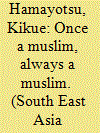

|
|
|
|
|
| Publication |
2012.
|
| Summary/Abstract |
It is commonly assumed that greater enforcement of Syariah [Islamic law] is the result of growing Islamism in civil society and/or the state. This article investigates the most burning political issue relating to the state enforcement of Syariah in contemporary Malaysia, that of apostasy. The author argues that it is the electoral imperative of the secular Muslim ruling elites, especially prime ministers, to cultivate broader support to achieve political survival, not only among their traditional power base in the rural Muslim constituencies, as is conventionally argued, but equally importantly among the urban non-Muslim (especially Chinese) constituencies, which has also conditioned the state enforcement of Syariah. The author's findings from Malaysia and observations on Indonesia further suggest that electoral competitiveness - rather than authoritarianism or theocracy - conditions state enforcement of Syariah, contrary to expectations.
|
|
|
|
|
|
|
|
|
|
|
|
|
|
|
|
| 5 |
ID:
117063


|
|
|
|
|
| Publication |
2012.
|
| Summary/Abstract |
This paper examines the links between Bangkok's smoking skyline and the political and economic aspirations of North Eastern Thais. The author proposes that much of what was at stake during the 2009 and 2010 political upheaval was closely tied to a constricted sense of citizenship apparent in the frustrated political and economic aspirations expressed by North East Thailand's urban poor. Through an ethnographic analysis of the experiences of residents of Khon Kaen's railway communities as they participate in a new housing project, the paper explores the obstacles that poor citizens encounter when they try to 'become right with the law' and 'unite' in the name of 'developing' themselves, their communities, their cities and their nation. In reflecting on the politics of belonging that arise during this project, the author's analysis reveals how hard these citizens work to comply with laws and to take part in national development projects, even when many of those same laws and processes frequently work against them. The author argues that, although coups and mass mobilizations form the most public faces of the current political moment, they simply reflect more pernicious, complex forms of the everyday politics facing poor citizens. Indeed, these frustrated aspirations expose the links between Bangkok's burning shopping malls and the charred provincial government buildings of the North East (Isan). The analysis suggests that the events of 2009 and 2010 were not an uprising against the state, but rather a movement demanding recognition and the opening of the political and economic order to the poor as full citizens.
|
|
|
|
|
|
|
|
|
|
|
|
|
|
|
|
| 6 |
ID:
117060
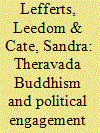

|
|
|
|
|
| Publication |
2012.
|
| Summary/Abstract |
The Thai-Lao of North East Thailand (Isan), the major ethnic group in a core area of the Red Shirt movement, have long expressed concern with the well-being of the muang - now nation-state - in which they reside. This paper explores the proposition that the moral foundations for continuing political engagement at the muang level are explicitly stated in the annual Theravada Buddhist festival, the Bun Phra Wet, celebrated in almost every Thai-Lao village. Moreover, these concerns also involve appropriate actions by the people to correct the systems in which they live.
|
|
|
|
|
|
|
|
|
|
|
|
|
|
|
|
| 7 |
ID:
117065
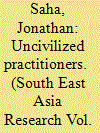

|
|
|
|
|
| Publication |
2012.
|
| Summary/Abstract |
Indian and Burmese medical subordinates were problematic figures for British colonial officials in Burma during the nineteenth century. They were intrinsic to their plans for furthering colonial medicine in the colony, at the expense of indigenous practices. Yet, at the same time, they were never under the complete control of British officials, often being accused of negligence, misconduct and outright corruption. In short, they were seen as a necessary evil. This article explores the role played by medical subordinates in colonial Burma, as well as the ambivalent British attitude towards them, by tracing the history of attempts to train them and by examining episodes of their misconduct, which was especially prominent in the production of medicolegal evidence. Focusing on these medical subordinates highlights the need for a historiographic rethink of the relationship between medicine and the colonial state. Medicine was not a tool of the colonial state, but a set of practices through which the state was performed.
|
|
|
|
|
|
|
|
|
|
|
|
|
|
|
|
|
|
|
|
|